语法学案
unit1 语法学案
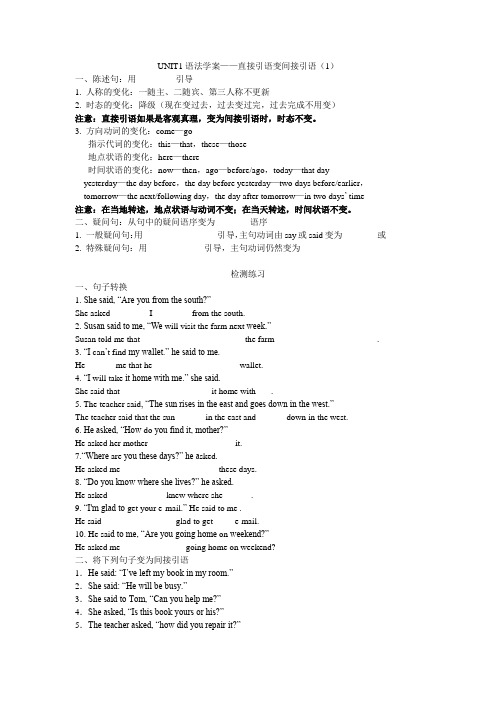
UNIT1语法学案——直接引语变间接引语(1)一、陈述句:用_________引导1. 人称的变化:一随主、二随宾、第三人称不更新2. 时态的变化:降级(现在变过去,过去变过完,过去完成不用变)注意:直接引语如果是客观真理,变为间接引语时,时态不变。
3. 方向动词的变化:come—go指示代词的变化:this—that,these—those地点状语的变化:here—there时间状语的变化:now—then,ago—before/ago,today—that dayyesterday—the day before,the day before yesterday—two days before/earlier,tomorrow—the next/following day,the day after tomorrow—in two days’ time注意:在当地转述,地点状语与动词不变;在当天转述,时间状语不变。
二、疑问句:从句中的疑问语序变为________语序1. 一般疑问句:用_________________引导,主句动词由say或said变为________或________2. 特殊疑问句:用_____________引导,主句动词仍然变为______________检测练习一、句子转换1. She said, “Are you from the south?”She asked ________ I ________ from the south.2. Susan said to me, “We will visit the farm next week.”Susan told me that ________ _______ _______ the farm ________ _______ _______.3. “I can’t find my wallet.” he said to me.He ______ me that he ______ ______ ______ wallet.4. “I will take it home with me.” she said.She said that ______ ______ _______ it home with ___.5. The teacher said, “The sun rises in the east and goes down in the west.”The teacher said that the sun ______ in the east and ______ down in the west.6. He asked, “How do you find it, mother?”He asked her mother ______ ______ ______ it.7.“Where are you these days?” he a sked.He asked me _______ _______ _______these days.8. “Do you know where she lives?” he asked.He asked ______ ______ knew where she ______.9. “I'm glad to get your e-mail.” He said to me .He said _____ _____ _____ glad to get ____ e-mail.10. He sai d to me, “Are you going home on weekend?”He asked me ____ _____ ____ going home on weekend?二、将下列句子变为间接引语1.He said: “I’ve left my book in my room.”2.She said: “He will be busy.”3.She said to Tom, “Can you help me?”4.She asked, “Is this book yours or his?”5.The teacher asked, “how did you repair it?”6.The teacher said, “The earth goes round the sun.”7.My father said, “Practice makes perfect.”8.The boy said to us, “ I usually get up at six every day.”9.He said, “We are still students.’10.He said, “I have studied English since I was a boy.”11.She said, “I read the book while I was waiting for a bus.12.Mr. Green said to them, “Joe told me all about his story when he asked for a job.”13.I said to him, “I have finished it.”14.She said to us,“ I’ll come here tomorrow.”15.“Where does your chemistry teacher live, Karen?” the young man asked.16.“I have gained the first place in the mathematics competition,” the little boy said happily. 17.“Will you go to the concert with me this evening?” Mary asked me.三、单项选择1. He asked me ________ I would go to Beijing by air the next day.A. that ifB. ifC. that whetherD. how2. He _____ they didn’t start early they wouldn’t catch the first bus.A. said that ifB. asked ifC. asked whetherD. said that whether3. He asked _______ for the violin.A. did I pay how muchB. I paid how muchC. how much I paidD. how much did I pay4. The teacher asked us ______ so much noise. (北京2003)A. don’t makeB. not makeC. not makingD. not to make5. The doctor asked me what _______ with me.A. is wrongB. wrong isC. was wrongD. wrong was6. He asked the boy where _______.A. his mother wasB. was his motherC. his mother isD. is his mother7. They said at last that they _______ better start out at once.A. had hadB. hadC. had beenD. was8. The teacher said that doubt _______ the key of knowledge.A. wereB. areC. wasD. is9. The actor said he _______ born in 1984.A. wasB. isC. beD. had been10. The teacher asked _______ for the bus.A. if I was waitingB. was I waitingC. you are waitingD. I was waiting11. He told me he had written to his father ________.A. the yesterdayB. before todayC. the day beforeD. the next day12. “You’ve already got well, haven’t you?” she asked.——She asked _________.A. if I have already got well, haven’t youB. whether I had already got wellC. have I already got wellD. had I already got well13. He asked me __________with me.A. what the matter isB. what the matter isC. what’s the matterD. what was the matter14. Can you make sure ___________?A. that he will come here todayB. when he will come here todayC. will he come here todayD. whether will he come here today15. John asked me ________ to visit his uncle’s farm with him.A. how would I like D. if would I like C. whether I would like D. which I would like。
高中语法学案--非谓语动词做主宾表(附答案)
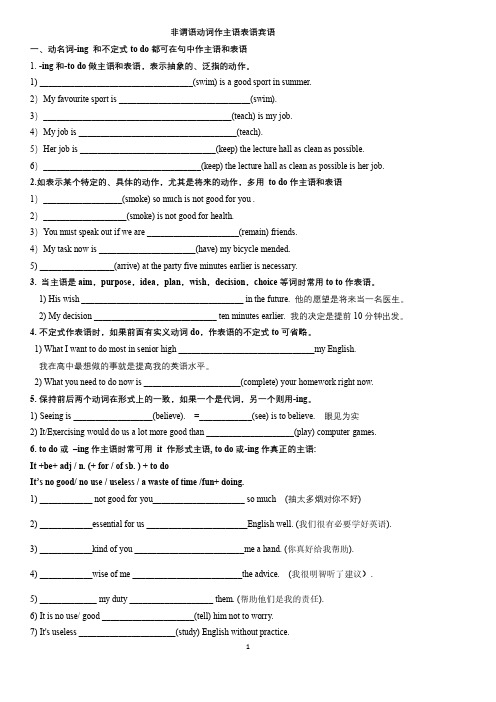
非谓语动词作主语表语宾语一、动名词-ing 和不定式to do都可在句中作主语和表语1. -ing和-to do做主语和表语,表示抽象的、泛指的动作。
1) ___________________________________(swim) is a good sport in summer.2)My favourite sport is ______________________________(swim).3)___________________________________________(teach) is my job.4)My job is ____________________________________(teach).5)Her job is _______________________________(keep) the lecture hall as clean as possible.6)____________________________________(keep) the lecture hall as clean as possible is her job.2.如表示某个特定的、具体的动作,尤其是将来的动作,多用to do作主语和表语1)__________________(smoke) so much is not good for you .2)___________________(smoke) is not good for health.3)You must speak out if we are _____________________(remain) friends.4)My task now is ______________________(have) my bicycle mended.5) _________________(arrive) at the party five minutes earlier is necessary.3. 当主语是aim,purpose,idea,plan,wish,decision,choice等词时常用to to作表语。
初中讲语法的教案
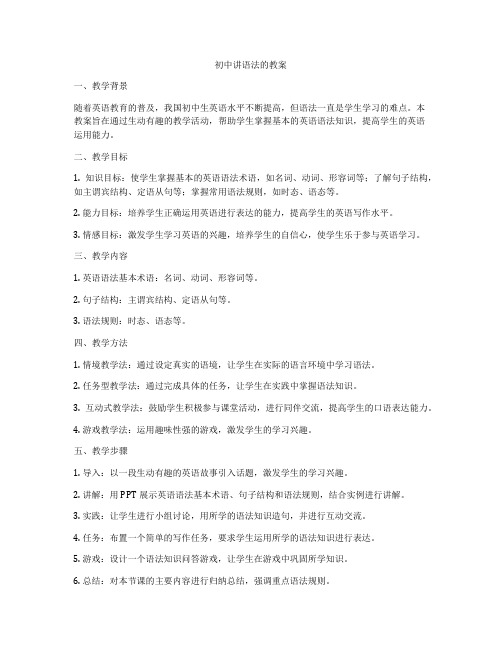
初中讲语法的教案一、教学背景随着英语教育的普及,我国初中生英语水平不断提高,但语法一直是学生学习的难点。
本教案旨在通过生动有趣的教学活动,帮助学生掌握基本的英语语法知识,提高学生的英语运用能力。
二、教学目标1. 知识目标:使学生掌握基本的英语语法术语,如名词、动词、形容词等;了解句子结构,如主谓宾结构、定语从句等;掌握常用语法规则,如时态、语态等。
2. 能力目标:培养学生正确运用英语进行表达的能力,提高学生的英语写作水平。
3. 情感目标:激发学生学习英语的兴趣,培养学生的自信心,使学生乐于参与英语学习。
三、教学内容1. 英语语法基本术语:名词、动词、形容词等。
2. 句子结构:主谓宾结构、定语从句等。
3. 语法规则:时态、语态等。
四、教学方法1. 情境教学法:通过设定真实的语境,让学生在实际的语言环境中学习语法。
2. 任务型教学法:通过完成具体的任务,让学生在实践中掌握语法知识。
3. 互动式教学法:鼓励学生积极参与课堂活动,进行同伴交流,提高学生的口语表达能力。
4. 游戏教学法:运用趣味性强的游戏,激发学生的学习兴趣。
五、教学步骤1. 导入:以一段生动有趣的英语故事引入话题,激发学生的学习兴趣。
2. 讲解:用PPT展示英语语法基本术语、句子结构和语法规则,结合实例进行讲解。
3. 实践:让学生进行小组讨论,用所学的语法知识造句,并进行互动交流。
4. 任务:布置一个简单的写作任务,要求学生运用所学的语法知识进行表达。
5. 游戏:设计一个语法知识问答游戏,让学生在游戏中巩固所学知识。
6. 总结:对本节课的主要内容进行归纳总结,强调重点语法规则。
7. 作业:布置课后作业,要求学生复习所学知识,并进行实践练习。
六、教学评价1. 课堂参与度:观察学生在课堂活动中的积极参与程度,了解学生的学习兴趣。
2. 口语表达:评估学生在小组讨论和游戏中的口语表达能力。
3. 写作能力:通过课后作业,评估学生的写作水平。
4. 语法知识掌握程度:通过课后测试或课堂提问,了解学生对语法知识的掌握情况。
初中语文语法知识教案
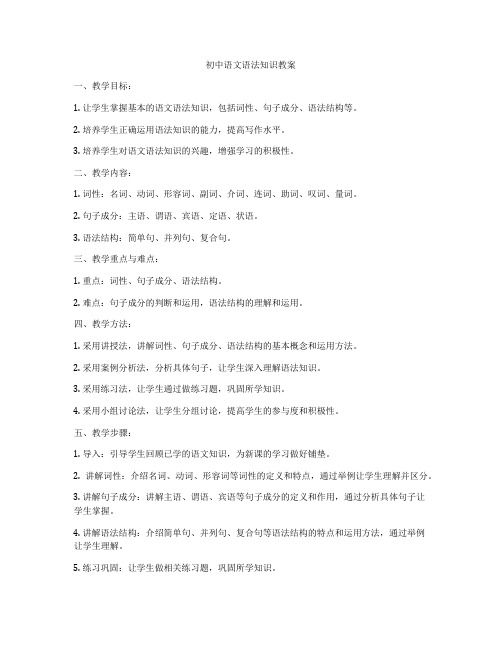
初中语文语法知识教案一、教学目标:1. 让学生掌握基本的语文语法知识,包括词性、句子成分、语法结构等。
2. 培养学生正确运用语法知识的能力,提高写作水平。
3. 培养学生对语文语法知识的兴趣,增强学习的积极性。
二、教学内容:1. 词性:名词、动词、形容词、副词、介词、连词、助词、叹词、量词。
2. 句子成分:主语、谓语、宾语、定语、状语。
3. 语法结构:简单句、并列句、复合句。
三、教学重点与难点:1. 重点:词性、句子成分、语法结构。
2. 难点:句子成分的判断和运用,语法结构的理解和运用。
四、教学方法:1. 采用讲授法,讲解词性、句子成分、语法结构的基本概念和运用方法。
2. 采用案例分析法,分析具体句子,让学生深入理解语法知识。
3. 采用练习法,让学生通过做练习题,巩固所学知识。
4. 采用小组讨论法,让学生分组讨论,提高学生的参与度和积极性。
五、教学步骤:1. 导入:引导学生回顾已学的语文知识,为新课的学习做好铺垫。
2. 讲解词性:介绍名词、动词、形容词等词性的定义和特点,通过举例让学生理解并区分。
3. 讲解句子成分:讲解主语、谓语、宾语等句子成分的定义和作用,通过分析具体句子让学生掌握。
4. 讲解语法结构:介绍简单句、并列句、复合句等语法结构的特点和运用方法,通过举例让学生理解。
5. 练习巩固:让学生做相关练习题,巩固所学知识。
6. 小组讨论:让学生分组讨论,分享自己的理解和心得,互相学习和交流。
7. 总结:对本节课的内容进行总结,强调重点和难点。
8. 作业布置:布置相关作业,让学生课后巩固所学知识。
六、教学反思:在教学过程中,要注重学生的参与和积极性的培养,通过案例分析和练习题,让学生深入理解语法知识。
同时,要关注学生的学习反馈,及时调整教学方法和节奏,确保教学效果。
初中全英文语法教案
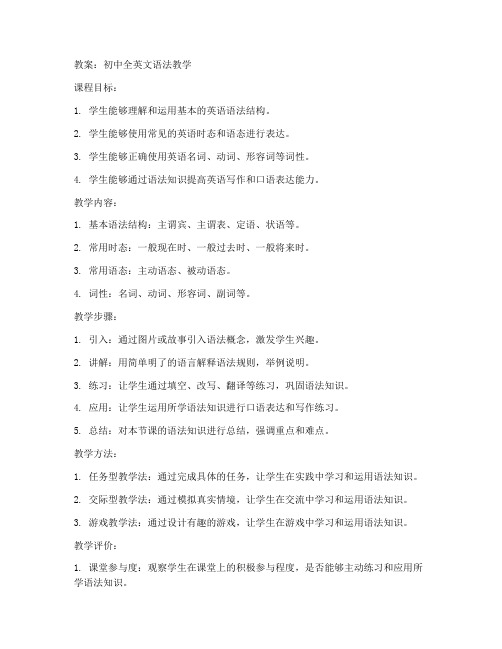
教案:初中全英文语法教学课程目标:1. 学生能够理解和运用基本的英语语法结构。
2. 学生能够使用常见的英语时态和语态进行表达。
3. 学生能够正确使用英语名词、动词、形容词等词性。
4. 学生能够通过语法知识提高英语写作和口语表达能力。
教学内容:1. 基本语法结构:主谓宾、主谓表、定语、状语等。
2. 常用时态:一般现在时、一般过去时、一般将来时。
3. 常用语态:主动语态、被动语态。
4. 词性:名词、动词、形容词、副词等。
教学步骤:1. 引入:通过图片或故事引入语法概念,激发学生兴趣。
2. 讲解:用简单明了的语言解释语法规则,举例说明。
3. 练习:让学生通过填空、改写、翻译等练习,巩固语法知识。
4. 应用:让学生运用所学语法知识进行口语表达和写作练习。
5. 总结:对本节课的语法知识进行总结,强调重点和难点。
教学方法:1. 任务型教学法:通过完成具体的任务,让学生在实践中学习和运用语法知识。
2. 交际型教学法:通过模拟真实情境,让学生在交流中学习和运用语法知识。
3. 游戏教学法:通过设计有趣的游戏,让学生在游戏中学习和运用语法知识。
教学评价:1. 课堂参与度:观察学生在课堂上的积极参与程度,是否能够主动练习和应用所学语法知识。
2. 练习完成情况:检查学生完成练习的情况,是否能够正确运用语法知识。
3. 口语表达和写作能力:通过口语表达和写作练习,评估学生对语法知识的掌握程度。
教学资源:1. 教材:选择适合初中生水平的英语教材,如《新概念英语》等。
2. 图片:准备与教学内容相关的图片,帮助学生更好地理解和记忆语法规则。
3. 故事:准备与教学内容相关的故事,激发学生兴趣并引导学生进行思考。
教学计划:1. 第一课时:介绍主谓宾、主谓表、定语、状语等基本语法结构。
2. 第二课时:学习一般现在时、一般过去时、一般将来时的运用。
3. 第三课时:学习主动语态和被动语态的运用。
4. 第四课时:学习名词、动词、形容词、副词等词性的运用。
现代汉语语法学案(带答案)

现代汉语语法学案(带答案)《现代汉语语法》学案学习目标课堂环节1、了解现代汉语的构成成分,词语的分类,短语结构类型,句子类型。
2、能正确划分句子成分,灵活掌握并运用现代汉语语法知识。
三、自我提升实词:名词、动词、形容词、数词、量词、代词虚词:副词、介词、连词、助词、叹词、拟声词自我提升检测:指出下列词语的词性:校园繁忙北京三万豁亮诚实中间对于哪里瞻仰战场颓唐夜晚很二分之一斤朵驾驶因为那里正自己坚固起来大伙政治愿意不名词:校园北京中间战场夜晚政治动词:瞻仰驾驶起来愿意形容词:繁忙豁亮诚实颓唐坚固数词:三万二分之一量词:斤朵代词:哪里那里自己大伙副词:很正不介词:对于因为四、合作学习思考题目:1、词和词按照一定的规则可以组成短语,短语是词和词构成的比词大、比句子小的语法单位。
汉语里有许多种短语,主要有几种类型,分别是什么?举例说明。
2、构成句子的词或短语间有一定的语法关系,根据不同的语法关系将句子划分为哪几个成分?要求:1、小组讨论,共同解决,记录员负责记录讨论结果。
(时间:10分钟)。
2、报告员在班级汇报,形式可灵活多变五、展示评价1、词和词按照一定的规则可以组成短语,短语是词和词构成的比词大、比句子小的语法单位。
汉语里有许多种短语,主要有几种类型,分别是什么?举例说明。
词和词组合成短语,主要有七种类型:1)并列短语:由两个或两个以上的名词、动词或形容词并列组成的短语,词和词之间是平等的联合关系,没有轻重主次之分,这种短语称为并列短语。
例如:报纸杂志老师和同学2)偏正短语:是由名词、动词或形容词与在它们前头起修饰作用的词组成的,名词、动词,形容词是中心语。
定语、状语与中心语的关系,是偏和正的关系。
例如:(我的)老师(快速地)旋转3)动宾短语:有的动词单独使用就可以表达一个明确的意思;有的动词还要在后边带上一个受动词支配的词,组成一个短语,才能表达一个明确的意思,这种短语叫做动宾短语。
其中受动词支配的词是宾语.表示动作、行为的对象、结果、处所等。
初中课本语法教案怎么写
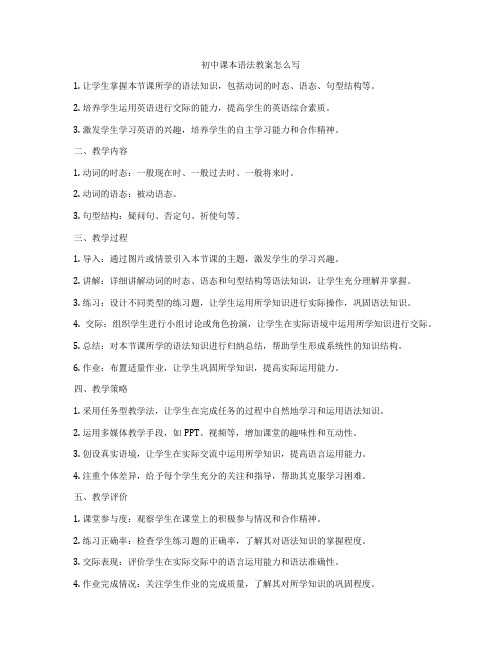
初中课本语法教案怎么写1. 让学生掌握本节课所学的语法知识,包括动词的时态、语态、句型结构等。
2. 培养学生运用英语进行交际的能力,提高学生的英语综合素质。
3. 激发学生学习英语的兴趣,培养学生的自主学习能力和合作精神。
二、教学内容1. 动词的时态:一般现在时、一般过去时、一般将来时。
2. 动词的语态:被动语态。
3. 句型结构:疑问句、否定句、祈使句等。
三、教学过程1. 导入:通过图片或情景引入本节课的主题,激发学生的学习兴趣。
2. 讲解:详细讲解动词的时态、语态和句型结构等语法知识,让学生充分理解并掌握。
3. 练习:设计不同类型的练习题,让学生运用所学知识进行实际操作,巩固语法知识。
4. 交际:组织学生进行小组讨论或角色扮演,让学生在实际语境中运用所学知识进行交际。
5. 总结:对本节课所学的语法知识进行归纳总结,帮助学生形成系统性的知识结构。
6. 作业:布置适量作业,让学生巩固所学知识,提高实际运用能力。
四、教学策略1. 采用任务型教学法,让学生在完成任务的过程中自然地学习和运用语法知识。
2. 运用多媒体教学手段,如PPT、视频等,增加课堂的趣味性和互动性。
3. 创设真实语境,让学生在实际交流中运用所学知识,提高语言运用能力。
4. 注重个体差异,给予每个学生充分的关注和指导,帮助其克服学习困难。
五、教学评价1. 课堂参与度:观察学生在课堂上的积极参与情况和合作精神。
2. 练习正确率:检查学生练习题的正确率,了解其对语法知识的掌握程度。
3. 交际表现:评价学生在实际交际中的语言运用能力和语法准确性。
4. 作业完成情况:关注学生作业的完成质量,了解其对所学知识的巩固程度。
六、教学反思在课后,教师应认真反思本节课的教学效果,针对学生的掌握情况,调整教学策略,以提高教学效果。
同时,关注学生的学习反馈,及时解决其在学习中遇到的问题,提高学生的英语水平。
初中汉语语法教案
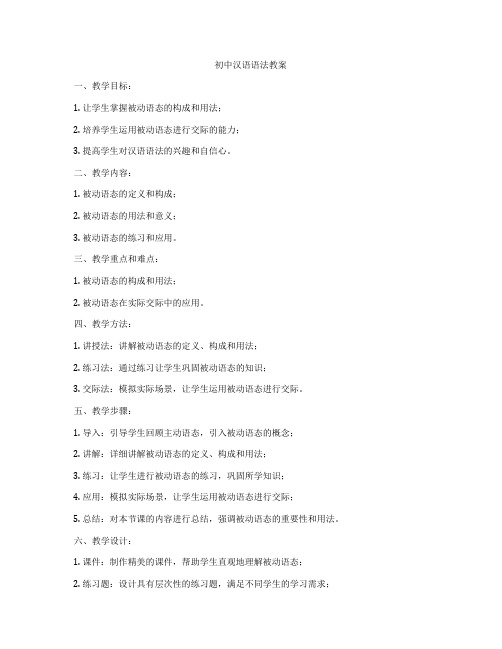
初中汉语语法教案一、教学目标:1. 让学生掌握被动语态的构成和用法;2. 培养学生运用被动语态进行交际的能力;3. 提高学生对汉语语法的兴趣和自信心。
二、教学内容:1. 被动语态的定义和构成;2. 被动语态的用法和意义;3. 被动语态的练习和应用。
三、教学重点和难点:1. 被动语态的构成和用法;2. 被动语态在实际交际中的应用。
四、教学方法:1. 讲授法:讲解被动语态的定义、构成和用法;2. 练习法:通过练习让学生巩固被动语态的知识;3. 交际法:模拟实际场景,让学生运用被动语态进行交际。
五、教学步骤:1. 导入:引导学生回顾主动语态,引入被动语态的概念;2. 讲解:详细讲解被动语态的定义、构成和用法;3. 练习:让学生进行被动语态的练习,巩固所学知识;4. 应用:模拟实际场景,让学生运用被动语态进行交际;5. 总结:对本节课的内容进行总结,强调被动语态的重要性和用法。
六、教学设计:1. 课件:制作精美的课件,帮助学生直观地理解被动语态;2. 练习题:设计具有层次性的练习题,满足不同学生的学习需求;3. 实际场景:设计模拟实际场景的交际活动,让学生学以致用。
七、教学评价:1. 课堂参与度:观察学生在课堂上的参与程度,了解学生的学习兴趣;2. 练习正确率:检查学生练习题的正确率,评估学生对被动语态的掌握程度;3. 交际表现:评价学生在实际交际中的表现,检验学生运用被动语态的能力。
八、课后作业:1. 复习被动语态的知识,巩固所学内容;2. 完成练习题,提高被动语态的运用能力;3. 搜集生活中的被动语态实例,增强对被动语态的理解。
九、教学反思:在课后对教学效果进行反思,总结课堂教学的优点和不足,针对性地调整教学策略,以提高教学效果。
同时,关注学生的学习反馈,及时调整教学内容和方法,满足学生的学习需求。
通过本节课的教学,使学生掌握被动语态的知识,能够熟练运用被动语态进行交际,提高学生的汉语水平。
同时,激发学生对汉语语法的兴趣,培养学生的自学能力和综合素质。
- 1、下载文档前请自行甄别文档内容的完整性,平台不提供额外的编辑、内容补充、找答案等附加服务。
- 2、"仅部分预览"的文档,不可在线预览部分如存在完整性等问题,可反馈申请退款(可完整预览的文档不适用该条件!)。
- 3、如文档侵犯您的权益,请联系客服反馈,我们会尽快为您处理(人工客服工作时间:9:00-18:30)。
I.DefinitionA phrasal verb is made up of a verb plus an adverb and/or a preposition. Some phrasal verbs are separable, while others are not.II.Formation1. verb + adverb(动词+副词)(动词+副词构成的动词短语,宾语既可以放在副词之前也可以放在副词之后,但如果宾语为人称代词,则必须放在动词和副词之间)Fleming tried out this mould on another bacterium.Fleming tried this mould out on another bacterium.Fleming found the mould had killed the cells of the bacteria and tried it out on another bacterium.They have agreed to put aside their differences in the interests of winning the election.They have agreed to put their differences aside in the interests of winning the election.They have differences, but they have agreed to put them aside in the interests of wining the election.Uncle Tom passed away (去世) many years ago.2.verb + preposition (动词+介词)(动词+介词构成的动词短语相当于及物动词,不可分开使用,其后可以直接跟宾语,宾语通常是名词、代词、动名词等,在被动语态中介词不能省略)Doctors are looking into the case for new treatment.Sometimes people ask for medicine that they do not really need.Kate is looking after her sick mother.I came across one of my old classmates Jane.I agree with (与……看法一致)you on that point.Before long he took to (爱上) a girl student in his class.3.verb + adverb + preposition(动词+副词+介词)(这类动词短语的宾语只能放在介词的后面,在“动词+副词+介词”的组合中,短语动词只能看作是一个动词,绝对不能拆开)How can you put up with this for so long?It is not right to look down upon those who have AIDS.Watch out for cars while you are crossing the street.We must catch up with them.Let’s face up to the situation.Your ideas fit in with mine.Let’ s get down to our business.We’ll get through with the project next month.I.Translation1. put on _____________2. ask for _____________3. give up_____________4. look around _____________5. break out_____________6. throw away _____________7. run away_____________8. 破门而入_____________9. 挑选_____________10. look after _____________11. think over_____________12. 死于_____________13. 依靠_____________14. laugh at _____________15. come across _____________16. care about _____________ 17. look through_____________18. 从事_____________19. 听_____________ 20. thanks to _____________ II.Fill in the blanks with proper phrasal verbs.1.The plane _______ (起飞) at 10am.2.At midnight, the party _________(终止).3.When did the war _________(爆发)?4.How did the quarrel__________ (发生)?5.The handle has __________ (脱落).6.The moon has _________ (出来).7.She soon _____________ (落后).8. I persuaded him to __________(放弃)the foolish plan.9. When I came into the teacher's room,our teacher is _____________(检查)our homework.10. I tried to telephone you but I couldn’t ________________(接通).III.Fill in the blanks with the correct prepositions or adverbs.1.Anne had to put_______ the appointment until later, as she had a meeting to attend.2.Many people find that as they get older, life seems to speed _______ .3.After the time for the competition is deceded _______, we must also choose the place.4.Two robbers broke_______ and robbed the bank of a lot of money.5. They were carrying_______ an important experiment.6 The teacher tried to explain the problem,but the explanation did not get across_______ the class.7.Only a handful_______experts support this new theory.8.The family split_______the pie into four pieces, so that everyone could get a share.9.Beijing has good air connections_______most large cities around the globe.10.People have planted many trees on the hill to prevent the soil from being washed_______. IV.Multiple choices.1. What shall we use for power when all the oil in the world has____?A. given outB. put outC.held upD. used up2.The computer system ____ suddenly while he was searching for information on the Internet.A. broke downB. broke outC. broke upD. broke in3. I was still sleeping when the fire _________, and then it spread quickly.A. broke outB. put outC. came outD. got out4.As I grow up in a small town at the foot of a mountain, the visit to the village _________ scenes of my childhood.A.called upB.called forC. called onD. called in5.—Four dollars a pair? I think it’s a bit too much.—If you buy three pairs, the piece for each will______ to three fifty..A.take downB. come downC. turn overD. go over6.—How did you_____French?—My experience helped a lot. I had lived in Paris with my aunt for 2 years before I came to EnglandA.pick outB.pick upC.set upD. set out7.It’s already 10 o’clock. I wonder how it_______that she was two hours late on such a short trip.A. came overB. came outC. came aboutD. came up8.It is not easy to learn Englis well but if you ________ , you will succeed in the end.A. hang upB.hang aboutC.hang onD.hang around9.Students who pass the test will be promoted ________the next grade.A. upB. intoC. toD. on10.—What should I do first?—The instructions say that you should mix flour ____ water carefully first.A.onB.withC. upD.to11.The factory has ________ workers because of the drop in sales.A. laid outB. laid offC. laid asideid down12.Mary is in bed with a fever and she can’t hope to _____cold in a few days.A.get rid ofB. get away withC.get offD.get out13.The captain was always honest with us and never____to disappointment, even when the ship sank.A. gave offB. gave wayC.gave upD.gave in14. When the wounded soldier life_____,he found himself in hospital.A.came off B.came out C. came back D. came back to15. Lincoln said it was not right for the south to break away ______the union.A. intoB. outC.toD. from16. Two robbers broke in and robbed the bank ______a lot of money.A.outB. fromC. forD.of17. It was no surprise when we were told that our grandfather had______.A. passed toB. passed outC. passed awayD.passed onto18 You'll have to work very hard to make up___ the time you lost.A. toB. /C. forD.on19. The castle dates _____to the 14th century.A. backB. inC. outD. for20.When London was bombed, many underground stations functioned ____bomb shelters.A. byB. atC. forD. asplete the passage with correct propositions or adverbs.I have just moved (1)____ a house in Bridge Street. Yesterday a beggar knocked (2)___ my door. He asked (3)____ a meal and a glass of beer. In return (4)____ this, the beggar stood (5)____ his head and sang songs. I gave him a meal. He ate (6)___ the food and drank the beer. Then I gave him another piece of cheese and he put it (7)____ his pocket, put (8)____ his hat and wentaway. Later a neighbor told me about him. Everybody knows him. His name is Percy Buttons. He calls(9)___ every house in the street once a month and always asks for a meal and a glass of beer. No one looks down (10)____ him. His visits are always welcome.语法练习答案。
